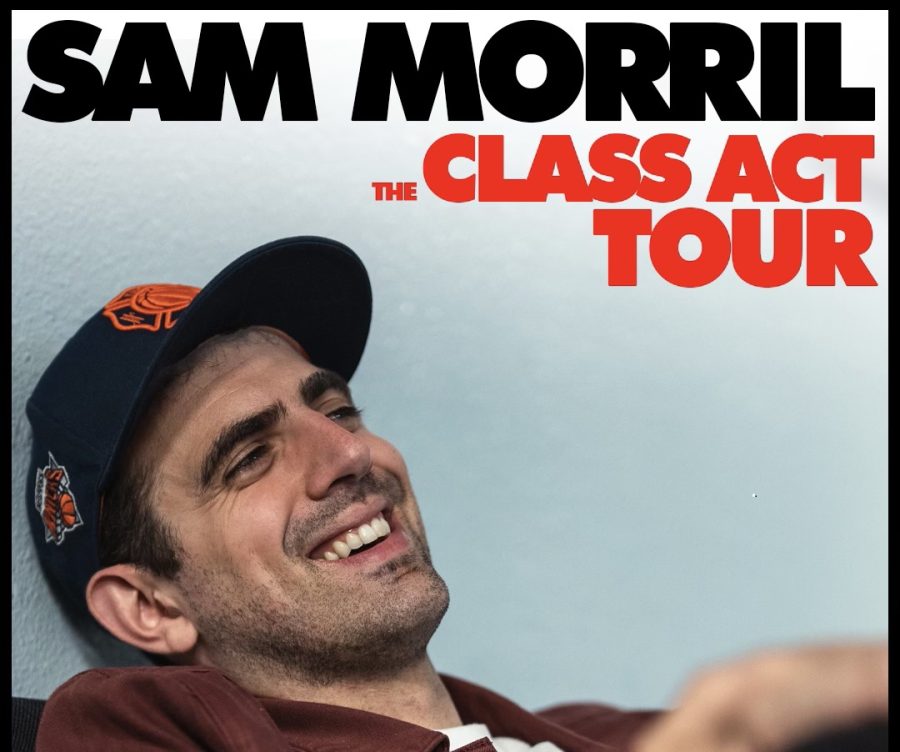Sam Morril will perform stand-up at the Pantages Theater in Minneapolis on Friday for two headlining shows. His two podcasts, “We Might be Drunk” and “Games with Names,” are out on streaming services now.
Morril, a lifelong New Yorker, performed for more than a decade in the famous clubs of New York with little national attention. Nowadays, Morril is headlining theaters across the country after the release of his third special for Netflix titled “Same Time Tomorrow.”
Morril’s jokes often bait the audience before switching their tone at the punchline. The opening joke of “Same Time Tomorrow” exemplifies Morril’s ability to bait and switch with ease. The swift and dry delivery Morril uses adds to the effectiveness of his often dark jokes.
The Minnesota Daily chatted with Morril during one of his stops on “The Class Act Tour.”
When did your first start doing open mics?
“I started right when I was finishing high school in New York City, so I was probably 18. It’s been a while, man. I’m 36 now. You don’t go as hard as you should when you’re starting out. Or at least you don’t realize how hard middle-level comics are working. At least some level of comedy writing is happening, because you might get a bit out of something.”
Does that mean that you’re writing stuff all the time then? Or what is your writing process?
“It means I am an unpleasant person to date and be close to.
No, but for real, it just means I am always a little bit in comedy mode. Even last night, something unpleasant happened on the road and we were immediately making jokes about it. It’s a weirdly optimistic way to live because when something terrible happens you’re like, ‘well, at least I’ll get a good bit.’ I think that’s why I have so many good breakup jokes. Everyone has had their heart broken and, out of all my material, breakup jokes hit all across the country most consistently.”
Speaking of shows, I heard that you taped seven different shows in Chicago for your latest special “Same Time Tomorrow.” Is that true?
“Well, that’s just me being crazy. It costs a lot of money to film that many, and I think usually comics just film like two. I just was like ‘ah it’s a small venue I could fill it a bunch of times’ and that way I could relax after every show. Plus filming a special is so stressful.
I don’t think I’ll ever film a special in New York City again. If you’re in the city, it’s just too many texts. I’ll get like 40 texts asking if people’s tickets are at the box office on the day of filming. It’s all people who mean well, and you don’t want to leave people hanging, but you don’t want to be on your phone texting when you could be thinking of the sets or relaxing with your friends in the green room.”
How does podcasting fit into your comedy writing? Are you thinking of bits while you do “We Might be Drunk” with Mark Normand and your other podcast “Games with Names” with former NFL player Julian Edelman?
“I try to think of funny angles for ‘Games with Names,’ but most of the stuff Edelman and I talk about on there doesn’t really translate into material on stage. I think you lose some people at a comedy show when you talk about sports. I like the ‘Games with Names’ one though because it requires a little extra preparation for guests sometimes. Like if we have a Boston Bruins hockey player on, I am going to have to do a little more research because I am more of a basketball guy and Julian obviously knows football really well.”
Do you have a most memorable guest on your sports podcast?
“Eli Manning was pretty great for me. Just that game as a New York dude, you know, beating the undefeated New England Patriots in the Super Bowl. Eli and Peyton Manning were both just great guests. They have a great sense of humor, they’re informed and they just know how to talk in an interview.”
Going back to the writing process, do you actually write your jokes out in a notebook or what’s your process there?
“I have to write them out. I’m visual so I need them in word documents, notepads and anything I can look at the joke on. The problem with writing it out too much though is that a joke can sound too written. So what I’ll do is talk it out onstage.
There’s almost a beauty to doing a joke for the first time onstage. When it’s too written, a joke is probably not going to do well. But when you don’t know exactly where the joke is going yet just how it’s going to end, you’ll sometimes stumble upon a couple extra punchlines along the way.”
This interview has been edited for length and clarity.














